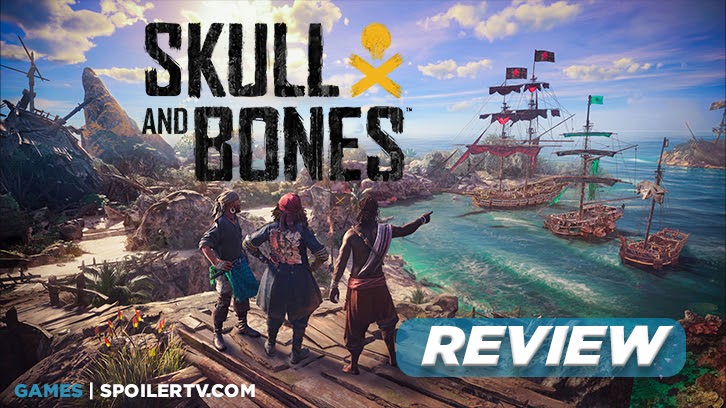
All views are those of the author and are not influenced by any copies of games publishers provide for review purposes.
Article Written by: Milo
About
the Game:
Assassin’s
Creed Black Flag
was transformative for the Assassin’s Creed franchise when it launched back in 2013 following the success of the iconic Ezio trilogy. Building on the
ground of Assassin’s Creed III, it took the franchise to the high seas
and gave us arguably the definitive pirate game – it wasn’t just a good i game,
it was a good game – with the ship-to-ship combat being just as fun as the myriad
of assassin and stealth kills that you had to perform, and tailing missions.
Naturally for Ubisoft the next stage would be expanding on that and going into
a full pirate game – making the ship to ship combat the entire focus of the
game to the point where the land combat is barely present – and even a
narrative is paper-thin, lacking the dense worldbuilding and story narrative
that gave Black Flag a rich plethora of pirate legend.
You
start in a similar vein to Black Flag, sailing the high seas as part of
an established crew being targeted by the British armada. The tutorial is
enough to give you the bare bones of the ship combat; kind of like in a mission
in a sequel to a game that came before where you still have access to all of
your weapons, only to lose them again when your ship is destroyed and you find
yourself cast aside, with nothing but a dhow, two loyal shipmates and a bucket
full of dreams – to become the most famous pirate that ever sailed the seas.
It’s a fun premise – but it quickly becomes
apparent that the flaws to Skull and Bones represent the flaws that
anyone who has played a modern Ubisoft game will recognise, not helped by a
lengthy eleven years in development that will set off alarm bells from the
start for any veteran gamer.
Gameplay:
The
gameplay of the ship to ship combat is restricted to the traditional pirate
fare of cannons blazing. There’s a fusion of PvP and solo single stories mixed
in with the ability to drop into co-op over the course of a campaign, and the
story itself is ripe for a lengthy narrative. For comparison, think the grand
scale of warfare that predominated Assassin’s Creed Odyssey, the game
feels like a journey – one grinded out to encourage an optimal live service
effect.
Safe
to say it doesn’t pull you in. your dhow gives you limited combat at the start
and you’re restricted to fighting sharks in tense battles for survival; not
quite what you expect from a pirate game but once you’ve crafted enough tools
to find cannons for a ship you’re able to tinker with its abilities and have a
bit more fun. However; that fun doesn’t last – it’s paper-thin, if you’ve
played any live service game in the past or even if you’re familiar with Suicide
Squad: Kill the Justice League, you’ll be aware of the issues that prevail Skull
and Bones.
The
tutorial gives you a dull start that doesn’t put the game’s most interesting
aspects first. It shows you how to cut down trees to gather resources –
something that you’d expect from a survival game and establishes a collection
of bland NPCs that could have been picked from any Ubisoft game with little in
the way of a consequence to its multi-choice dialogue trees. Furthermore, it
doesn’t help that Skull and Bones lets you put arguably too much customization
into its lead protagonist, robbing your main character of a standard,
centralised story that helps make them memorable. The theme is rags to riches
yet it fails to give me a compelling reason why I should care about any
character involved.
Skull
and Bones doesn’t
really have an exciting storyline and it feels like it’s so far removed from
the Black Flag world that the only comparisons really lie in the ship
combat feeling similar, but even then – it’s sparse, a back-to-basics game
potentially on purpose to avoid comparisons but it can’t help but invite them. Maybe
Skull and Bones should have done more to encourage these comparisons as
the game is at its best when it’s lifting directly from that world – the volleys
of cannonballs that you get to fire into the hull of an enemy ship in a bid to
sink it are some of the most satisfying and appealing parts of the game and its
main selling point – so once you eventually get to the ship to ship combat, Skull
and Bones delivers in spades – enthralling, fun and entertaining whether it’s
online or not.
It’s
just a shame that a game that came out in 2013 for the Xbox 360 and PlayStation
3 feels more advanced and adventurous, more swashbuckling and more true to the spirit
of being a pirate than Skull and Bones – a game aimed at current gen
titles. And what’s more is that Black Flag ultimately had more to do –
so much of Skull and Bones feels empty and lifeless. Hell, there’s no
swashbuckling – you can’t board enemy ships and the game has you sink them
before you can, rendering a game about pirates that barely feels like a pirate
game at all.
One
strength that it has over its inspiration is the ability to customise your
ship; and the sacrifice of a main narrative and character gives you the freedom
to do so. There’s rockets and cannons you can add, a variety of flags and
inventive ballistas you can add, but the combat doesn’t feel as fluid or
nuanced. Ultimately there’s just no joy to be had here – and Skull and Bones
suffers as a result – those expecting depth in its combat will go in disappointed,
it’s a massive case of style over substance and that diminishes the appeal to
return to its world.
Visuals:
The
visuals at the heart of Skull and Bones are visually stunning, appealing
and do a real job at immersing you in the pirate world but at the same time
lack the life of Black Flag. The openness of the world shows the sh
eer
variety of its oceanic beauty, the small scale shanty towns mixed in with the
caverns and rage of the storms. I had the most fun with the game when the tides
changed and I was fighting against the current of the storm – the landscape
feels enveloping that gives a kind of beauty that feels tailor-made for a
desktop wallpaper. But just as with the gameplay, Skull and Bones feels
like it tries to be too big – and it ends up feeling empty and hollow. Yes
there may be a lot to do – but is there any substance here? And the answer is
no.
Sound:
One
of the most engaging parts of Black Flag was the variety of authentic
pirate sea shanties that made the game’s characters so full of life. It will
require a few tweaks to get the perfect settings on the sound just right – but once
you find that it’s right for you, Skull and Bones sounds like a dream –
a richly fulfilling pirate experience. That said, the audio mixing has uneven
results – some things are louder than others and the sounds that are meant to be
intentionally loud feel quieter. It leads to a flawed experience that has been prevalent
in many a Ubisoft game – not unique to Skull and Bones.
Performance:
Whilst
there were moments of lag it was nothing too significant to affect my overall
experience of Skull and Bones. The game gives you the option on the PS5
to switch between quality and performance – which feels like a shame, when
games consoles should have the ability to handle good graphics and 60 fps.
Sometimes the level of detail doesn’t quite feel as immersive when running on
quality; but the game is beautifully rendered regardless – it comes with a
choice of trade-off. It feels perhaps more of a sticking issue when the game
doesn’t have the most modernised of graphics and doesn’t feel as commanding to
run as other recent Triple A games.
Accessibility:
Subtitle
settings allow for the ship, activity and world speech to encourage a real
variety of dialogue control. Everything is flexible designed to appeal to the widest
demographic possible: closed caption subtitles are also there, and there is a
variety of languages available for the game. You can toggle aim assist for a
more challenging experience – or to have the game guide your hand. The choice is
yours – and the wealth of accessibility options remains one of Skull and
Bones’ biggest strengths. The game can be played solo but it is a live
service game, so will function best always connected to the internet.
Replayability:
If
you enjoy the endless grind, Skull and Bones will keep you suited for hours.
If you’re bored by the game; however, it loses its entertainment value fast. The
game itself is surprisingly long, clocking in at over fifty hours for the main
campaign to do everything, but the main story will be 25 hours and the side
content provides an additional thirty, if not more.
Verdict:
Skull
and Bones is
a game where style over substances feels increasingly prevalent. There’s no
depth to its gameplay and when a game that came out in 2013 two generations ago
feels like it has more to offer, comparisons feel unavoidable – and at every turn, Assassin’s Creed IV: Black Flag, comes out on top – it’s more true
capture of a pirate experience than what Skull and Bones is, which is essentially a glorified shipping simulator.
Gameplay: 7/10
Visuals: 6/10
Sound: 6/10
Performance: 6/10
Replayability: 6/10
Source link













